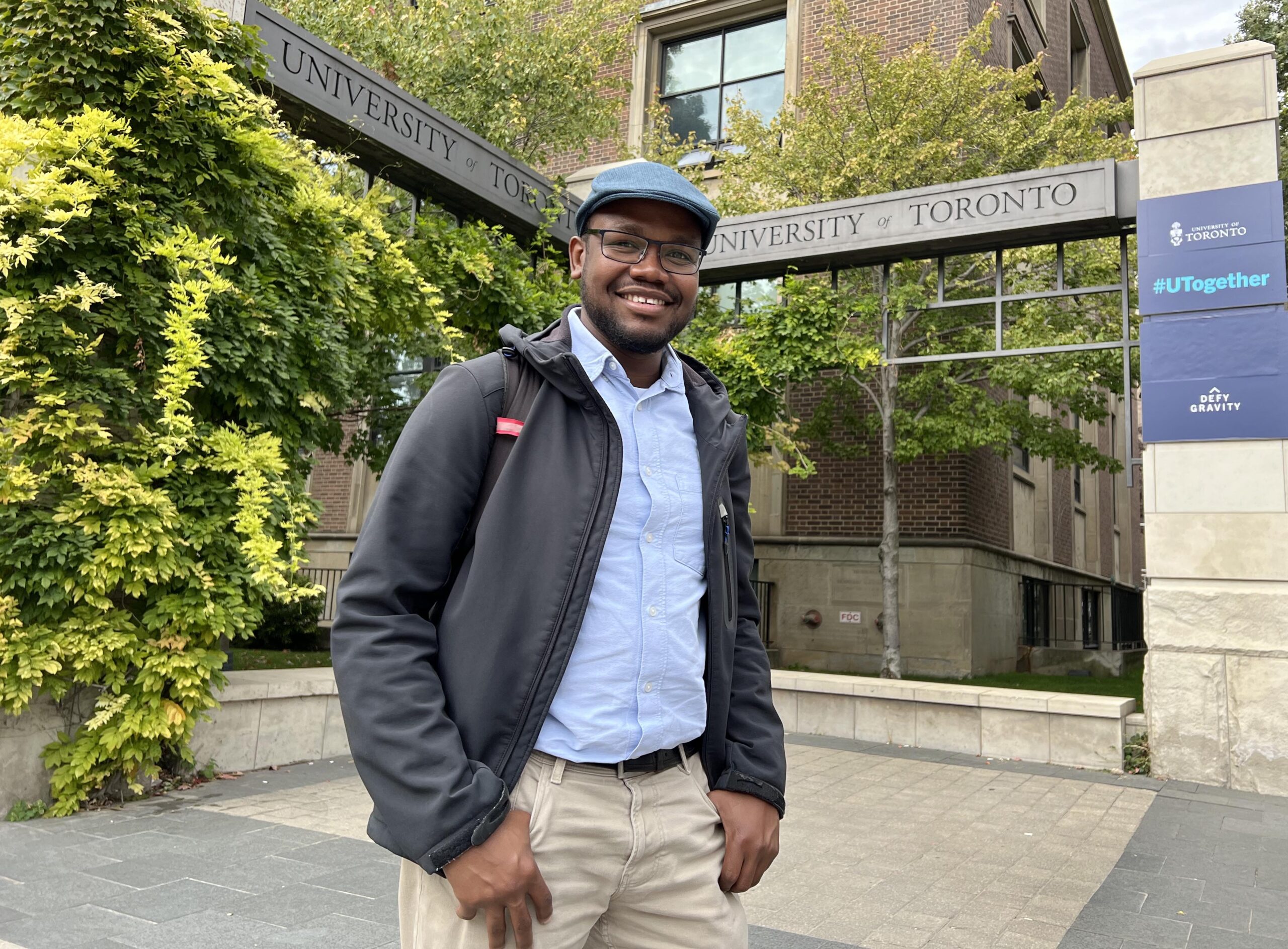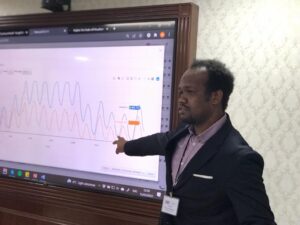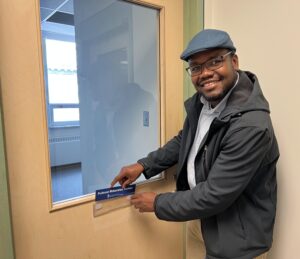
Professor Mohammed Basheer joins the Department of Civil & Mineral Engineering as an Assistant Professor as of October 1, 2023.
CivMin spoke with Professor Basheer to learn more about his research direction, passion for teaching, and what attracted him to Toronto. He has relocated from Germany to join our Department.
“We wholeheartedly welcome our newest faculty member to the Department,” says CivMin Chair Marianne Hatzopoulou offering her greetings. “Students will benefit from the exciting new elements Professor Basheer brings to the Department in teaching and research. Join us in offering our newest professor a warm welcome to CivMin.”

Q: Can you tell us a little about yourself as an introduction (education, where you're from, etc).
I am Sudanese. I grew up and did my primary and secondary education in a town in central Sudan called Wad Medani. I moved to the capital of Sudan, Khartoum, to study Civil Engineering at the University of Khartoum, followed by two years of work in the private sector, where I contributed to water engineering projects in West Africa. Then I moved to Cologne, Germany, where I did a master's degree in Integrated Water Resources Management at Cologne University of Applied Sciences. After that, I worked at the same university as a Research Associate for about a year and a half, conducting research work on water management in East Africa. Following that, I moved to Manchester, the United Kingdom, where I did my Ph.D. in Civil Engineering (focusing on water engineering and economics) at The University of Manchester and then worked as a Research Fellow at the university for one year. Then I moved back to Germany, but this time to Berlin, as a Research Fellow at Humboldt University of Berlin, funded by Alexander von Humboldt Foundation. I like watching and playing soccer, playing squash, hiking, and experiencing different cultures and foods. My native language is Arabic; I speak English fluently and German at an intermediate level. I have been a Manchester United fan through and through since childhood.
Q: Could you explain the focus of your research?
Coupled human-natural systems, such as river basins, have supported civilization throughout history by providing critical services such as water, food, and energy. But the pressure on these systems is mounting faster than ever due to population growth, economic development, urbanization, and lifestyle changes. My research focuses on developing methods and tools that can help plan efficient human interventions in river basins, considering engineering, social, political, economic, and environmental dimensions to provide essential water, energy, and food services, help achieve sustainable development goals, and adapt to and mitigate climate change and other future uncertainties. Such interventions could include, for example, building or removing infrastructure (such as dams or irrigation schemes) or changing the management policies of existing infrastructure. I spent several years creating methods and tools for designing infrastructure management and expansion plans for politically tense transboundary water resource systems (e.g., the Nile Basin), integrating simulation methods, artificial intelligence techniques, and stakeholder engagement.
Q: Why did you choose U of T?

Several reasons encouraged me to join the University of Toronto, from which I can mention a few. First and foremost, the University of Toronto has a longstanding reputation for academic excellence. It consistently ranks among the top universities globally and is renowned for its rigorous academic programs and distinguished faculty. Joining such a prestigious institution allows me to be part of a community committed to pushing the boundaries of knowledge and fostering intellectual growth.
Second, the University of Toronto has a diverse and inclusive environment. With vibrant multicultural campuses, the university fosters an enriching learning environment. This diversity of ideas and experiences enhances the educational experience for both students and faculty and prepares students to thrive in a globalized world. Third, the University of Toronto is known for its strong research. It houses world-class research facilities and provides ample opportunities for interdisciplinary collaboration.
As a professor, this research environment enables me to pursue my scholarly interests and make a meaningful impact on society. Lastly, Toronto as a city offers a wealth of opportunities beyond academia. It is a multicultural hub with a thriving arts and cultural scene, diverse industries, and a strong sense of community. Being situated in such a cosmopolitan city provides an enriching experience for me and offers valuable connections and collaborations that can benefit my research and my students' professional development.

Q: What are you most looking forward to in your new position?
I look forward to establishing research collaborations within the Department of Civil & Mineral Engineering and beyond. I am excited to start teaching and interacting with students. I am enthusiastic about establishing a network with water management organizations in Canada and globally to address the pressing challenges river basins face.
Q: As a new professor, what one piece of advice would you give to new students?
In his book "Outliers," Malcolm Gladwell states, "It is not the brightest who succeed... Nor is success simply the sum of the decisions and efforts we make on our own behalf. It is, rather, a gift. Outliers are those who have been given opportunities—and who have had the strength and presence of mind to seize them." As a student at the University of Toronto, you have a fantastic opportunity before you. Make sure to have the strength and presence of mind to take full advantage of it, and be assured that your abilities and intelligence can develop through dedication, hard work, and perseverance. Additionally, remember that the educational journey is as significant as the ultimate goal. So, embrace and relish the process along the way.

Q: What do you hope to accomplish in your new position/during your time at U of T Engineering?
I hope to build a world-class interdisciplinary research group that studies river basins from engineering, social, political, economic, and environmental angles and has a tangible impact on policymaking and societies. I hope to achieve this through accurate simulations of natural resources systems and their interactions with human systems, using artificial intelligence to facilitate planning future intervention decisions in natural resource systems, and actively engaging with stakeholders to ensure demand-driven research and co-production of outcomes.
I hope to contribute to educating the next generation of environmental engineers who will make a difference. I plan to tie research and teaching activities to ensure that students benefit from my research and be involved in research activities.
Q: What is the most memorable experience in your career so far?
For me, public outreach through mainstream media has been both memorable and challenging at times. As I have worked on designing management approaches for transboundary water resource systems for several years, I have noticed that mainstream media exhibits a strong appetite for this topic, particularly when political tensions exist between nations. However, I have come to realize that the media often seeks attention-grabbing headlines, requiring me to exercise great care in my explanations to avoid misrepresentation. Despite the intricacies involved, I engage with the media with pleasure as it contributes to having an immediate real-world impact.
Q: Finally, is there anything fun/unusual/unexpected about yourself you'd like to share with our CivMin audience?
I have an affinity for maps. From traditional paper maps to digital interactive maps, I appreciate their beauty and utility. I often spend hours creating maps using modern-day software and picking their colors. It gives me a great deal of relaxation!
Connect with Professor Mohammed Basheer:
Professor page: https://civmin.utoronto.ca/home/about-us/directory/mohammed-basheer/
Twitter: https://twitter.com/Moh_Basheer17
GoogleScholar: https://scholar.google.com/citations?user=KM_oVpkAAAAJ&hl=en
ResearchGate: https://www.researchgate.net/profile/Mohammed-Basheer-9